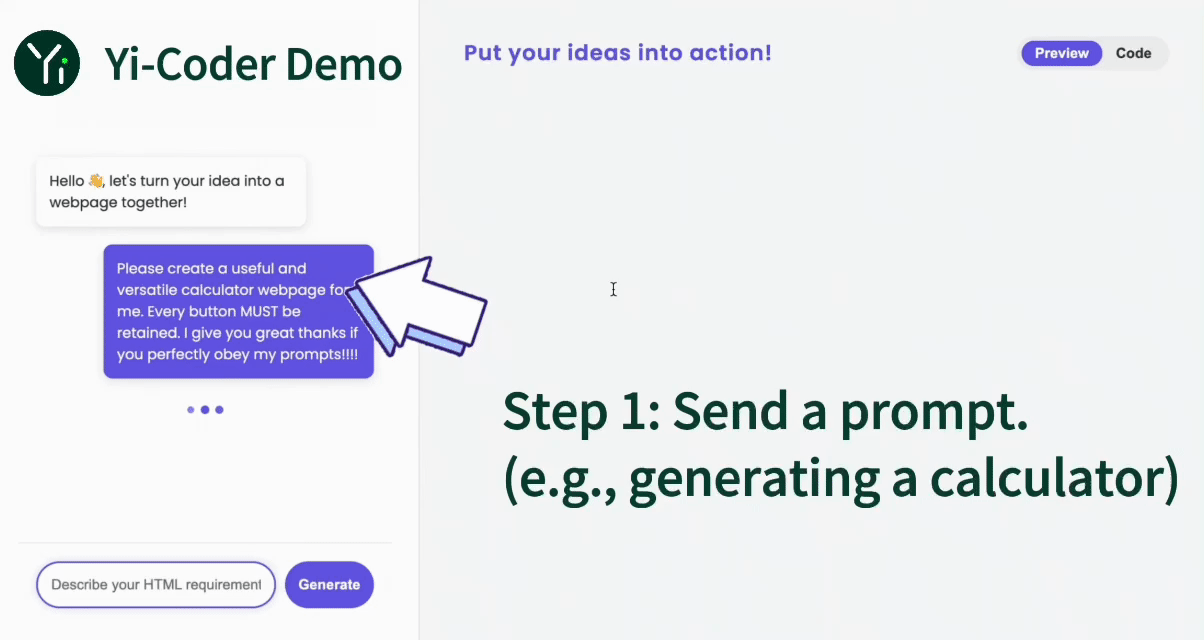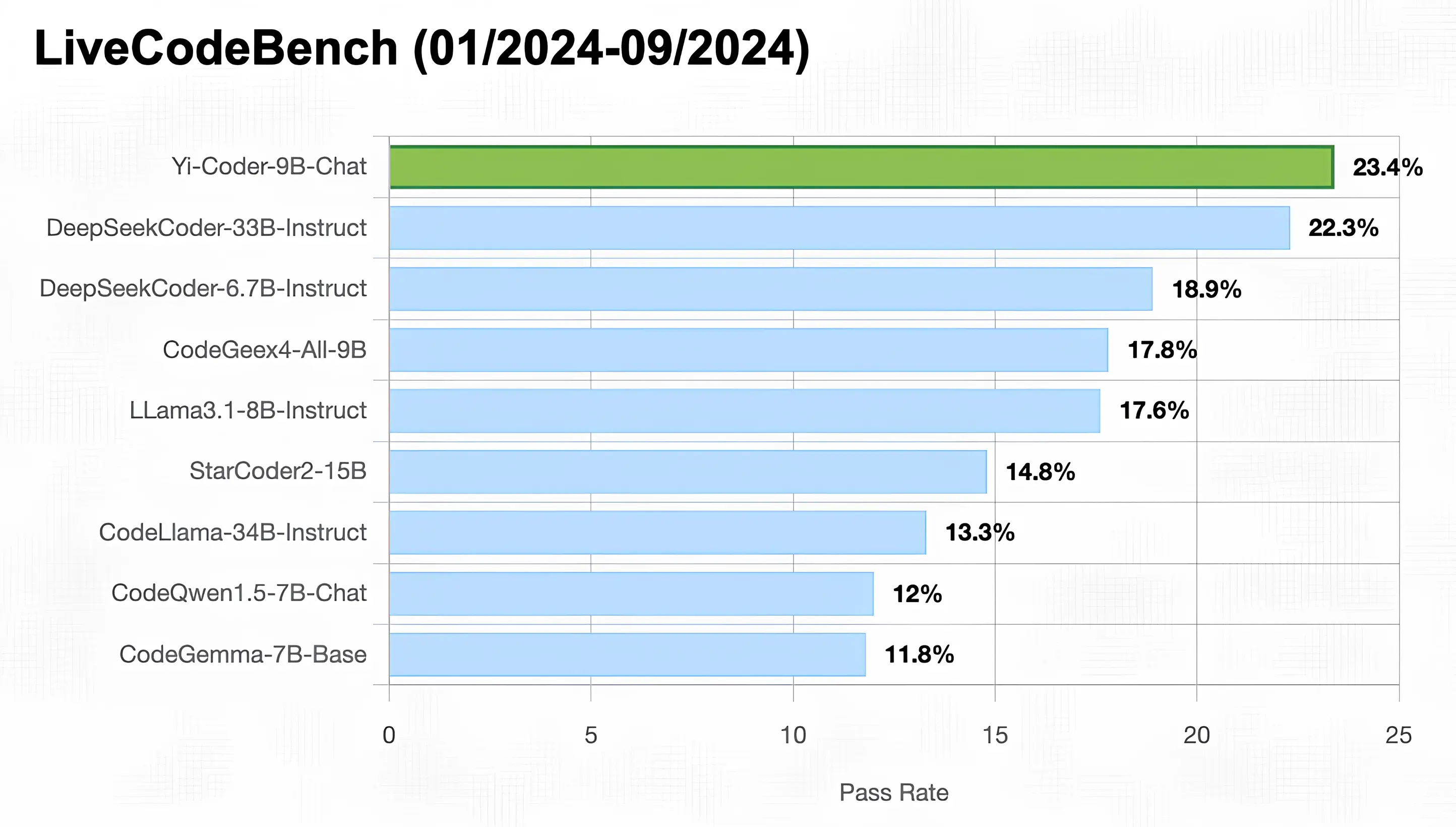---
license: apache-2.0
pipeline_tag: text-generation
tags:
- code
language:
- code
base_model: 01-ai/Yi-Coder-9B-Chat
model_creator: 01.AI
model_name: Yi-Coder-9B-Chat
model_type: llama
datasets:
- m-a-p/CodeFeedback-Filtered-Instruction
quantized_by: CISC
---
# Yi-Coder-9B-Chat - SOTA GGUF
- Model creator: [01.AI](https://huggingface.co/01-ai)
- Original model: [Yi-Coder-9B-Chat](https://huggingface.co/01-ai/Yi-Coder-9B-Chat)
## Description
This repo contains State Of The Art quantized GGUF format model files for [Yi-Coder-9B-Chat](https://huggingface.co/01-ai/Yi-Coder-9B-Chat).
Quantization was done with an importance matrix that was trained for ~1M tokens (256 batches of 4096 tokens) of answers from the [CodeFeedback-Filtered-Instruction](https://huggingface.co/datasets/m-a-p/CodeFeedback-Filtered-Instruction) dataset.
**Update September 19th**: Requantized with new imatrix after finding a [bug](https://github.com/ggerganov/llama.cpp/pull/9543) in `llama-imatrix` that degraded the data set. Also removed the Fill-in-Middle tokens as they are [not properly supported](https://huggingface.co/01-ai/Yi-Coder-9B-Chat/discussions/5).
**Update September 5th**: Marked <|im_start|> as a special token, fixing tokenization.
Corrected EOS (<|im_end|>) and added EOT (<|endoftext|>) token to prevent infinite responses (am I the only one actually dog-fooding my own quants?).
## Prompt template: ChatML
```
<|im_start|>system
{system_prompt}<|im_end|>
<|im_start|>user
{prompt}<|im_end|>
<|im_start|>assistant
```
## Compatibility
These quantised GGUFv3 files are compatible with llama.cpp from February 27th 2024 onwards, as of commit [0becb22](https://github.com/ggerganov/llama.cpp/commit/0becb22ac05b6542bd9d5f2235691aa1d3d4d307)
They are also compatible with many third party UIs and libraries provided they are built using a recent llama.cpp.
## Explanation of quantisation methods
Click to see details
The new methods available are:
* GGML_TYPE_IQ1_S - 1-bit quantization in super-blocks with an importance matrix applied, effectively using 1.56 bits per weight (bpw)
* GGML_TYPE_IQ1_M - 1-bit quantization in super-blocks with an importance matrix applied, effectively using 1.75 bpw
* GGML_TYPE_IQ2_XXS - 2-bit quantization in super-blocks with an importance matrix applied, effectively using 2.06 bpw
* GGML_TYPE_IQ2_XS - 2-bit quantization in super-blocks with an importance matrix applied, effectively using 2.31 bpw
* GGML_TYPE_IQ2_S - 2-bit quantization in super-blocks with an importance matrix applied, effectively using 2.5 bpw
* GGML_TYPE_IQ2_M - 2-bit quantization in super-blocks with an importance matrix applied, effectively using 2.7 bpw
* GGML_TYPE_IQ3_XXS - 3-bit quantization in super-blocks with an importance matrix applied, effectively using 3.06 bpw
* GGML_TYPE_IQ3_XS - 3-bit quantization in super-blocks with an importance matrix applied, effectively using 3.3 bpw
* GGML_TYPE_IQ3_S - 3-bit quantization in super-blocks with an importance matrix applied, effectively using 3.44 bpw
* GGML_TYPE_IQ3_M - 3-bit quantization in super-blocks with an importance matrix applied, effectively using 3.66 bpw
* GGML_TYPE_IQ4_XS - 4-bit quantization in super-blocks with an importance matrix applied, effectively using 4.25 bpw
* GGML_TYPE_IQ4_NL - 4-bit non-linearly mapped quantization with an importance matrix applied, effectively using 4.5 bpw
Refer to the Provided Files table below to see what files use which methods, and how.
## Provided files
| Name | Quant method | Bits | Size | Max RAM required | Use case |
| ---- | ---- | ---- | ---- | ---- | ----- |
| [Yi-Coder-9B-Chat.IQ1_S.gguf](https://huggingface.co/CISCai/Yi-Coder-9B-Chat-SOTA-GGUF/blob/main/Yi-Coder-9B-Chat.IQ1_S.gguf) | IQ1_S | 1 | 1.9 GB| 2.2 GB | smallest, significant quality loss |
| [Yi-Coder-9B-Chat.IQ1_M.gguf](https://huggingface.co/CISCai/Yi-Coder-9B-Chat-SOTA-GGUF/blob/main/Yi-Coder-9B-Chat.IQ1_M.gguf) | IQ1_M | 1 | 2.0 GB| 2.3 GB | very small, significant quality loss |
| [Yi-Coder-9B-Chat.IQ2_XXS.gguf](https://huggingface.co/CISCai/Yi-Coder-9B-Chat-SOTA-GGUF/blob/main/Yi-Coder-9B-Chat.IQ2_XXS.gguf) | IQ2_XXS | 2 | 2.3 GB| 2.6 GB | very small, high quality loss |
| [Yi-Coder-9B-Chat.IQ2_XS.gguf](https://huggingface.co/CISCai/Yi-Coder-9B-Chat-SOTA-GGUF/blob/main/Yi-Coder-9B-Chat.IQ2_XS.gguf) | IQ2_XS | 2 | 2.5 GB| 2.8 GB | very small, high quality loss |
| [Yi-Coder-9B-Chat.IQ2_S.gguf](https://huggingface.co/CISCai/Yi-Coder-9B-Chat-SOTA-GGUF/blob/main/Yi-Coder-9B-Chat.IQ2_S.gguf) | IQ2_S | 2 | 2.7 GB| 2.9 GB | small, substantial quality loss |
| [Yi-Coder-9B-Chat.IQ2_M.gguf](https://huggingface.co/CISCai/Yi-Coder-9B-Chat-SOTA-GGUF/blob/main/Yi-Coder-9B-Chat.IQ2_M.gguf) | IQ2_M | 2 | 2.9 GB| 3.1 GB | small, greater quality loss |
| [Yi-Coder-9B-Chat.IQ3_XXS.gguf](https://huggingface.co/CISCai/Yi-Coder-9B-Chat-SOTA-GGUF/blob/main/Yi-Coder-9B-Chat.IQ3_XXS.gguf) | IQ3_XXS | 3 | 3.2 GB| 3.5 GB | very small, high quality loss |
| [Yi-Coder-9B-Chat.IQ3_XS.gguf](https://huggingface.co/CISCai/Yi-Coder-9B-Chat-SOTA-GGUF/blob/main/Yi-Coder-9B-Chat.IQ3_XS.gguf) | IQ3_XS | 3 | 3.5 GB| 3.8 GB | small, substantial quality loss |
| [Yi-Coder-9B-Chat.IQ3_S.gguf](https://huggingface.co/CISCai/Yi-Coder-9B-Chat-SOTA-GGUF/blob/main/Yi-Coder-9B-Chat.IQ3_S.gguf) | IQ3_S | 3 | 3.6 GB| 3.9 GB | small, greater quality loss |
| [Yi-Coder-9B-Chat.IQ3_M.gguf](https://huggingface.co/CISCai/Yi-Coder-9B-Chat-SOTA-GGUF/blob/main/Yi-Coder-9B-Chat.IQ3_M.gguf) | IQ3_M | 3 | 3.8 GB| 4.1 GB | medium, balanced quality - recommended |
| [Yi-Coder-9B-Chat.IQ4_XS.gguf](https://huggingface.co/CISCai/Yi-Coder-9B-Chat-SOTA-GGUF/blob/main/Yi-Coder-9B-Chat.IQ4_XS.gguf) | IQ4_XS | 4 | 4.5 GB| 4.7 GB | small, substantial quality loss |
Generated importance matrix file: [Yi-Coder-9B-Chat.imatrix.dat](https://huggingface.co/CISCai/Yi-Coder-9B-Chat-SOTA-GGUF/blob/main/Yi-Coder-9B-Chat.imatrix.dat)
**Note**: the above RAM figures assume no GPU offloading with 4K context. If layers are offloaded to the GPU, this will reduce RAM usage and use VRAM instead.
## Example `llama.cpp` command
Make sure you are using `llama.cpp` from commit [0becb22](https://github.com/ggerganov/llama.cpp/commit/0becb22ac05b6542bd9d5f2235691aa1d3d4d307) or later.
```shell
./llama-cli -ngl 49 -m Yi-Coder-9B-Chat.IQ4_XS.gguf --color -c 131072 --temp 0 --repeat-penalty 1.1 -p "<|im_start|>system\nYou are a helpful assistant.<|im_end|>\n<|im_start|>\n{prompt}<|im_end|>\n<|im_start|>assistant\n"
```
Change `-ngl 49` to the number of layers to offload to GPU. Remove it if you don't have GPU acceleration.
Change `-c 131072` to the desired sequence length.
If you are low on V/RAM try quantizing the K-cache with `-ctk q8_0` or even `-ctk q4_0` for big memory savings (depending on context size).
There is a similar option for V-cache (`-ctv`), only available if you enable Flash Attention (`-fa`) as well.
For other parameters and how to use them, please refer to [the llama.cpp documentation](https://github.com/ggerganov/llama.cpp/blob/master/examples/main/README.md)
## How to run from Python code
You can use GGUF models from Python using the [llama-cpp-python](https://github.com/abetlen/llama-cpp-python) module.
### How to load this model in Python code, using llama-cpp-python
For full documentation, please see: [llama-cpp-python docs](https://llama-cpp-python.readthedocs.io/en/latest/).
#### First install the package
Run one of the following commands, according to your system:
```shell
# Prebuilt wheel with basic CPU support
pip install llama-cpp-python --extra-index-url https://abetlen.github.io/llama-cpp-python/whl/cpu
# Prebuilt wheel with NVidia CUDA acceleration
pip install llama-cpp-python --extra-index-url https://abetlen.github.io/llama-cpp-python/whl/cu121 (or cu122 etc.)
# Prebuilt wheel with Metal GPU acceleration
pip install llama-cpp-python --extra-index-url https://abetlen.github.io/llama-cpp-python/whl/metal
# Build base version with no GPU acceleration
pip install llama-cpp-python
# With NVidia CUDA acceleration
CMAKE_ARGS="-DGGML_CUDA=on" pip install llama-cpp-python
# Or with OpenBLAS acceleration
CMAKE_ARGS="-DGGML_BLAS=ON -DGGML_BLAS_VENDOR=OpenBLAS" pip install llama-cpp-python
# Or with AMD ROCm GPU acceleration (Linux only)
CMAKE_ARGS="-DGGML_HIPBLAS=on" pip install llama-cpp-python
# Or with Metal GPU acceleration for macOS systems only
CMAKE_ARGS="-DGGML_METAL=on" pip install llama-cpp-python
# Or with Vulkan acceleration
CMAKE_ARGS="-DGGML_VULKAN=on" pip install llama-cpp-python
# Or with SYCL acceleration
CMAKE_ARGS="-DGGML_SYCL=on -DCMAKE_C_COMPILER=icx -DCMAKE_CXX_COMPILER=icpx" pip install llama-cpp-python
# In windows, to set the variables CMAKE_ARGS in PowerShell, follow this format; eg for NVidia CUDA:
$env:CMAKE_ARGS = "-DGGML_CUDA=on"
pip install llama-cpp-python
```
#### Simple llama-cpp-python example code
```python
from llama_cpp import Llama
# Chat Completion API
llm = Llama(model_path="./Yi-Coder-9B-Chat.IQ4_XS.gguf", n_gpu_layers=49, n_ctx=131072)
print(llm.create_chat_completion(
repeat_penalty = 1.1,
messages = [
{
"role": "user",
"content": "Pick a LeetCode challenge and solve it in Python."
}
]
))
```

🐙 GitHub •
👾 Discord •
🐤 Twitter •
💬 WeChat
📝 Paper •
💪 Tech Blog •
🙌 FAQ •
📗 Learning Hub
# Intro
Yi-Coder is a series of open-source code language models that delivers state-of-the-art coding performance with fewer than 10 billion parameters.
Key features:
- Excelling in long-context understanding with a maximum context length of 128K tokens.
- Supporting 52 major programming languages:
```bash
'java', 'markdown', 'python', 'php', 'javascript', 'c++', 'c#', 'c', 'typescript', 'html', 'go', 'java_server_pages', 'dart', 'objective-c', 'kotlin', 'tex', 'swift', 'ruby', 'sql', 'rust', 'css', 'yaml', 'matlab', 'lua', 'json', 'shell', 'visual_basic', 'scala', 'rmarkdown', 'pascal', 'fortran', 'haskell', 'assembly', 'perl', 'julia', 'cmake', 'groovy', 'ocaml', 'powershell', 'elixir', 'clojure', 'makefile', 'coffeescript', 'erlang', 'lisp', 'toml', 'batchfile', 'cobol', 'dockerfile', 'r', 'prolog', 'verilog'
```
For model details and benchmarks, see [Yi-Coder blog](https://01-ai.github.io/) and [Yi-Coder README](https://github.com/01-ai/Yi-Coder).

# Models
| Name | Type | Length | Download |
|--------------------|------|----------------|---------------------------------------------------------------------------------------------------------------------------------------------------|
| Yi-Coder-9B-Chat | Chat | 128K | [🤗 Hugging Face](https://huggingface.co/01-ai/Yi-Coder-9B-Chat) • [🤖 ModelScope](https://www.modelscope.cn/models/01ai/Yi-Coder-9B-Chat) • [🟣 wisemodel](https://wisemodel.cn/models/01.AI/Yi-Coder-9B-Chat) |
| Yi-Coder-1.5B-Chat | Chat | 128K | [🤗 Hugging Face](https://huggingface.co/01-ai/Yi-Coder-1.5B-Chat) • [🤖 ModelScope](https://www.modelscope.cn/models/01ai/Yi-Coder-1.5B-Chat) • [🟣 wisemodel](https://wisemodel.cn/models/01.AI/Yi-Coder-1.5B-Chat) |
| Yi-Coder-9B | Base | 128K | [🤗 Hugging Face](https://huggingface.co/01-ai/Yi-Coder-9B) • [🤖 ModelScope](https://www.modelscope.cn/models/01ai/Yi-Coder-9B) • [🟣 wisemodel](https://wisemodel.cn/models/01.AI/Yi-Coder-9B) |
| Yi-Coder-1.5B | Base | 128K | [🤗 Hugging Face](https://huggingface.co/01-ai/Yi-Coder-1.5B) • [🤖 ModelScope](https://www.modelscope.cn/models/01ai/Yi-Coder-1.5B) • [🟣 wisemodel](https://wisemodel.cn/models/01.AI/Yi-Coder-1.5B) |
| |
# Benchmarks
As illustrated in the figure below, Yi-Coder-9B-Chat achieved an impressive 23% pass rate in LiveCodeBench, making it the only model with under 10B parameters to surpass 20%. It also outperforms DeepSeekCoder-33B-Ins at 22.3%, CodeGeex4-9B-all at 17.8%, CodeLLama-34B-Ins at 13.3%, and CodeQwen1.5-7B-Chat at 12%.

# Quick Start
You can use transformers to run inference with Yi-Coder models (both chat and base versions) as follows:
```python
from transformers import AutoTokenizer, AutoModelForCausalLM
device = "cuda" # the device to load the model onto
model_path = "01-ai/Yi-Coder-9B-Chat"
tokenizer = AutoTokenizer.from_pretrained(model_path)
model = AutoModelForCausalLM.from_pretrained(model_path, device_map="auto").eval()
prompt = "Write a quick sort algorithm."
messages = [
{"role": "system", "content": "You are a helpful assistant."},
{"role": "user", "content": prompt}
]
text = tokenizer.apply_chat_template(
messages,
tokenize=False,
add_generation_prompt=True
)
model_inputs = tokenizer([text], return_tensors="pt").to(device)
generated_ids = model.generate(
model_inputs.input_ids,
max_new_tokens=1024,
eos_token_id=tokenizer.eos_token_id
)
generated_ids = [
output_ids[len(input_ids):] for input_ids, output_ids in zip(model_inputs.input_ids, generated_ids)
]
response = tokenizer.batch_decode(generated_ids, skip_special_tokens=True)[0]
print(response)
```
For getting up and running with Yi-Coder series models quickly, see [Yi-Coder README](https://github.com/01-ai/Yi-Coder).



